Serving 515 students in grades Prekindergarten-8, William W. Hall Academy ranks in the bottom 50% of all schools in Maryland for overall test scores (math proficiency is bottom 50%, and reading proficiency is bottom 50%).
The percentage of students achieving proficiency in math is 3% (which is lower than the Maryland state average of 25%). The percentage of students achieving proficiency in reading/language arts is 25% (which is lower than the Maryland state average of 45%).
The student:teacher ratio of 15:1 is higher than the Maryland state level of 14:1.
Minority enrollment is 99% of the student body (majority Black), which is higher than the Maryland state average of 68% (majority Black and Hispanic).
Quick Stats (2025)
- Grades: Prekindergarten-8
- Enrollment: 515 students
- Student:Teacher Ratio: 15:1
- Minority Enrollment: 99%
- Overall Testing Rank: Bottom 50% in MD
- Math Proficiency: 3% (Btm 50%)
- Reading Proficiency: 25% (Btm 50%)
- Science Proficiency: 10-14% (Btm 50%)
- Source: National Center for Education Statistics (NCES), MD Dept. of Education
Top Rankings
William W. Hall Academy ranks among the top 20% of public schools in Maryland for:
Category
Attribute
Percent Eligible For Free Lunch
Student Attention
School Overview
William W. Hall Academy's student population of 515 students has declined by 6% over five school years.
The teacher population of 34 teachers has declined by 20% over five school years.
Grades Offered
Grades Prekindergarten-8
(offers virtual instruction)
(offers virtual instruction)
Total Students
515 students
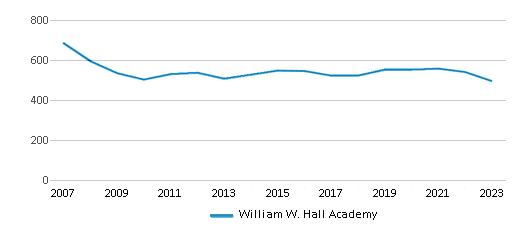
Gender %
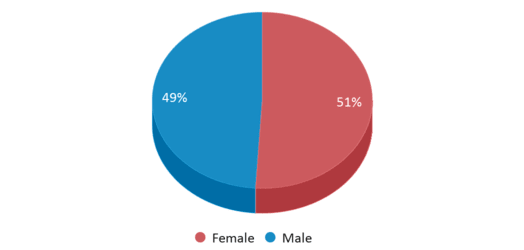
Total Classroom Teachers
34 teachers
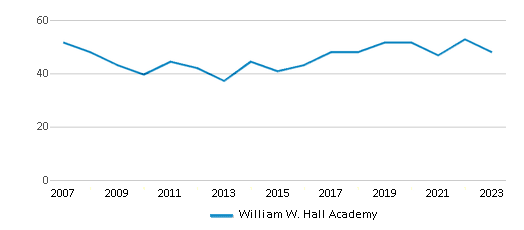
Students by Grade
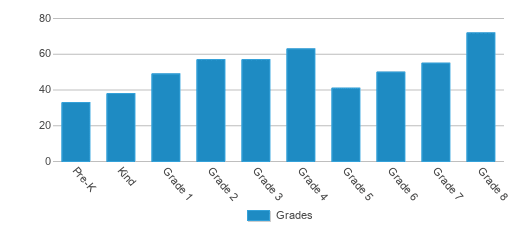
School Rankings
William W. Hall Academy ranks within the bottom 50% of all 1,347 schools in Maryland (based off of combined math and reading proficiency testing data).
The diversity score of William W. Hall Academy is 0.51, which is less than the diversity score at state average of 0.74. The school's diversity has stayed relatively flat over five school years.
Overall Testing Rank
#1216 out of 1347 schools
(Bottom 50%)
(Bottom 50%)
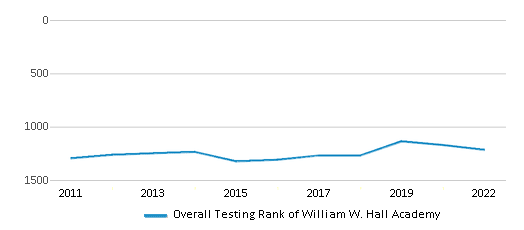
Math Test Scores (% Proficient)
3%
25%
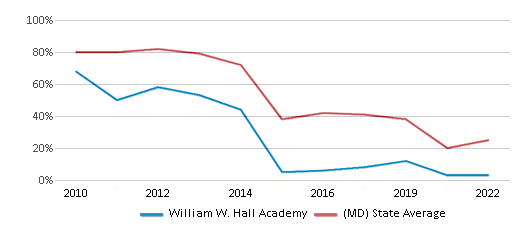
Reading/Language Arts Test Scores (% Proficient)
25%
45%
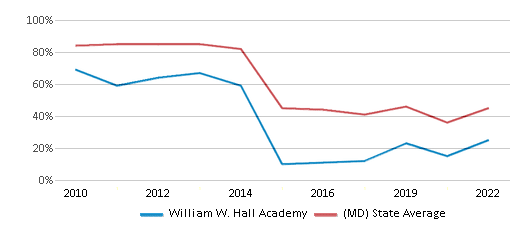
Science Test Scores (% Proficient)
10-14%
36%
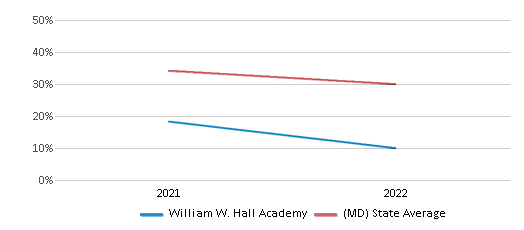
Student : Teacher Ratio
15:1
14:1
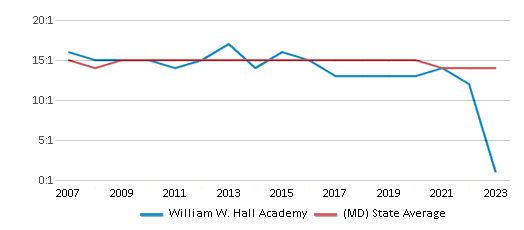
American Indian
n/a
n/a
Asian
n/a
7%
Hispanic
49%
23%
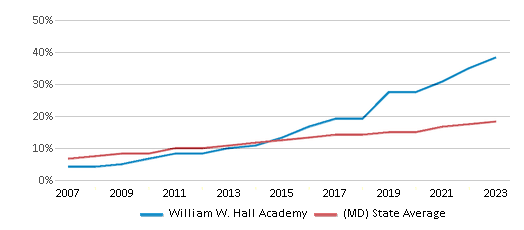
Black
50%
33%
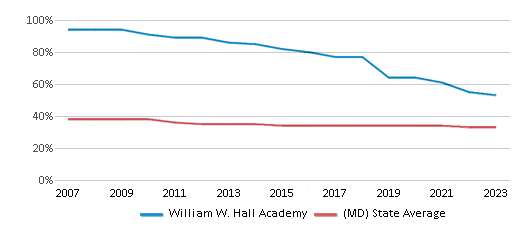
White
1%
32%
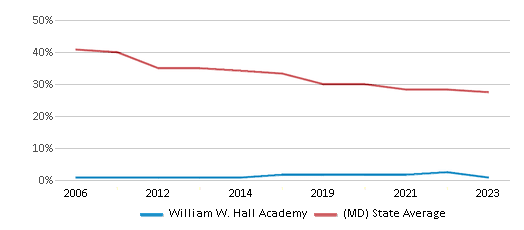
Hawaiian
n/a
n/a
Two or more races
n/a
5%
All Ethnic Groups
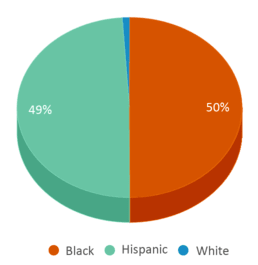
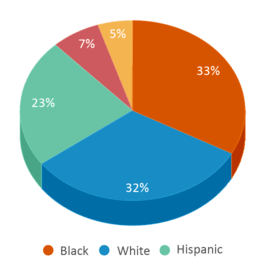
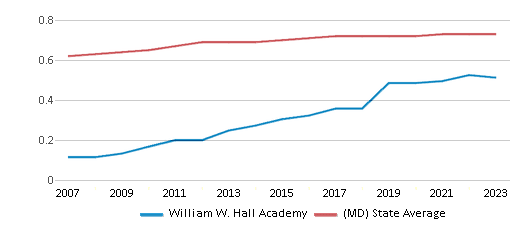
Participates in the National School Lunch Program (NSLP)
Yes
Eligible for Free Lunch
77%
44%
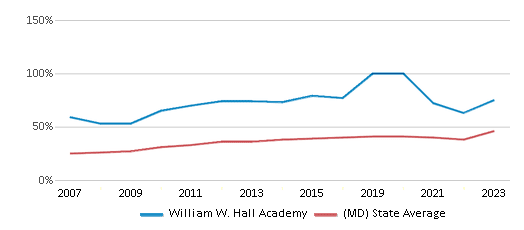
Eligible for Reduced Lunch
10%
5%
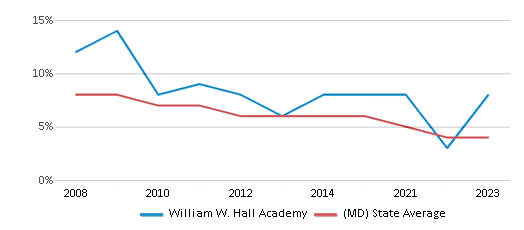
School Statewide Testing
School District Name
Source: National Center for Education Statistics (NCES), MD Dept. of Education
Profile last updated: 02/09/2025
Frequently Asked Questions
What is William W. Hall Academy's ranking?
William W. Hall Academy is ranked #1216 out of 1,347 schools, which ranks it among the bottom 50% of public schools in Maryland.
What schools are William W. Hall Academy often compared to?
William W. Hall Academyis often viewed alongside schools like Bradbury Heights Elementary School, Walker Mill Middle School by visitors of our site.
What percent of students have achieved state testing proficiency in math and reading?
3% of students have achieved math proficiency (compared to the 25% MD state average), while 25% of students have achieved reading proficiency (compared to the 45% MD state average).
How many students attend William W. Hall Academy?
515 students attend William W. Hall Academy.
What is the racial composition of the student body?
50% of William W. Hall Academy students are Black, 49% of students are Hispanic, and 1% of students are White.
What is the student:teacher ratio of William W. Hall Academy?
William W. Hall Academy has a student ration of 15:1, which is higher than the Maryland state average of 14:1.
What grades does William W. Hall Academy offer ?
William W. Hall Academy offers enrollment in grades Prekindergarten-8 (offers virtual instruction).
What school district is William W. Hall Academy part of?
William W. Hall Academy is part of Prince George's County School District.
School Reviews
Review William W. Hall Academy. Reviews should be a few sentences in length. Please include any comments on:
- Quality of academic programs, teachers, and facilities
- Availability of music, art, sports and other extracurricular activities
Recent Articles

What Is A Charter School?
Explore the world of charter schools in this comprehensive guide. Learn about their history, how they operate, and the pros and cons of this educational innovation. Discover key facts about charter schools, including admission policies, demographics, and funding, as well as what to look for when considering a charter school for your child.

10 Reasons Why High School Sports Benefit Students
Discover the 10 compelling reasons why high school sports are beneficial for students. This comprehensive article explores how athletics enhance academic performance, foster personal growth, and develop crucial life skills. From improved fitness and time management to leadership development and community representation, learn why participating in high school sports can be a game-changer for students' overall success and well-being.

February 05, 2025
Understanding the U.S. Department of Education: Structure, Impact, and EvolutionWe explore how the Department of Education shapes American education, from its cabinet-level leadership to its impact on millions of students, written for general audiences seeking clarity on this vital institution.





